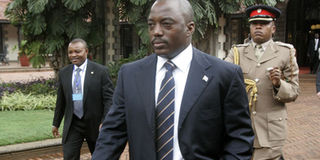Kabila calls for moral revolution in DR Congo

Democratic Republic of Congo's President Joseph Kabila Photo/FILE
KINSHASA, Wednesday
President Joseph Kabila called on Wednesday for a “moral revolution” in the Democratic Republic of Congo at ceremonies marking the 50th anniversary of the war-torn country’s independence from Belgium.
Congolese should put an end to “attacks on human life and dignity” and in particular the widespread rape that has become a feature of the guerrilla conflicts racking the vast nation, he said. Mr Kabila also singled out “tribalism, regionalism, favouritism, irresponsibility, theft, embezzlement of public property and everything else contrary to values.”
He was addressing an audience including United Nations Secretary General Ban Ki-Moon, Belgium’s King Albert II and more than a dozen African heads of state. Wednesday’s ceremonies also came four days after the funeral of one of the country’s best-known human rights activists, Floribert Chebeya, who was found dead in his car on June 2 in Kinshasa.
In April, Margot Wallstrom, the UN’s special representative on sexual violence in conflict, called the Democratic Republic of Congo (DRC) the “rape capital of the world,” and urged the Security Council to end impunity for the perpetrators of such crimes. “If women continue to suffer sexual violence, it is not because the law is inadequate to protect them, but because it is inadequately enforced,” she told the 15-member council.
“Women have no rights, if those who violate their rights go unpunished,” added the UN special representative tasked with combating sexual violence against women and children in conflicts. Aid agencies have frequently expressed concern at the degree of impunity and the lack of justice for victims, especially in DRC’s strife-torn eastern regions.
Earlier on Wednesday, Canada deprived Democratic Republic of Congo the chance to celebrate its 50th independence anniversary with an $8 billion debt relief deal by delaying the accord over a dispute about mining rights. President Kabila had pushed for the relief to be finalised in time for the celebration to show the world his country was putting its painful past behind it following the war of 1998-2003 in which some five million people died.
But a World Bank decision on the debt was postponed at Canada’s request due to a legal dispute that exploded last year between Vancouver-based First Quantum Minerals and the Kinshasa government over mining rights, officials said. “Canada did it due to ongoing concerns related to governance, rule of law, and preoccupations about what these realities mean for sustainability of the debt relief programme,” said a Canadian official who requested anonymity.
Separately, a spokesman for Finance Minister Jim Flaherty cited concern about the cancellation of mining contracts after a review of the sector by Kinshasa and noted that Canada had already last year slowed the debt relief process to raise such concerns. “We will continue to work with our international partners to ensure Canadian investment in the DRC is protected, while empowering those within the country as they work towards peace and sustainable economic development,” the spokesman said.
An official at the World Bank’s sister organisation, the International Monetary Fund, said it was still considering whether to hold its meeting on the debt relief on Wednesday. Yet both bodies must give the green light for the deal and the earliest the World Bank board will sit is Thursday.
The accord, which could have slashed Congo’s annual debt service burden to $194 million from $920 million, was to be a high point of events attended by Ban Ki-moon and Albert II, king of ex-colonial power Belgium. Ahead of the celebrations, Kabila did manage to secure the start of the withdrawal of UN peacekeepers from his country.
Hundreds of thousands of Congolese turned out for a parade in Kinshasa, the bedraggled Congolese capital which has been given a hurried facelift by Chinese labourers for the occasion. “Slowly but surely Congo is recovering, as a giant who is waking up after a long sleep,” President Kabila said in a speech in front of parliament which drew only muted applause.
The speech was at times barely audible and it was not clear if Kabila made a reference to debt relief. Earlier, religious leaders led prayers at the venue for a speedy write-off. The party mood in Kinshasa has been further dampened by the still-unexplained death earlier this month of Floribert Chebeya, the country’s leading human rights campaigner, who spoke out against arbitrary killings and torture of political dissidents.
Yet despite high levels of public dissatisfaction at the state of the country before next year’s general election, and continued violent rebellions across the country, there is also a streak of pride that it can hold such a celebration at all. “Despite all the problems facing our country we are proud today,” said polio victim Baudouin Mangula, named after a Belgian king and celebrating his own 50th birthday on Wednesday.
“It’s thanks to peace in our country that we can parade here — that is a big achievement.” “As far as we are concerned the DRC has moved backwards more than forwards,” Congolese bishops wrote in a joint text to mark the anniversary. The “dream of a beautiful Congo” has been destroyed, they said. For much of its post-colonial history, the DR Congo was bled dry by the kleptocratic regime of Joseph Mobutu Sese Seko, who came to power in a 1965 coup and ruled for 32 years.



